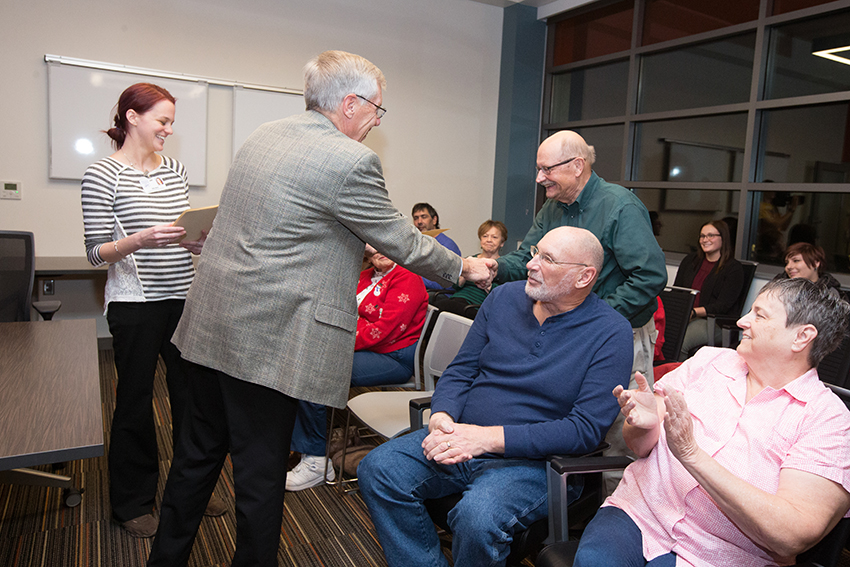Tech-savvy students help older adults learn technology

By Amber Stark '99
For the past five years, students in Dr. Kate Magsamen-Conrad’s classes have been helping older adults get comfortable with technology. The result? Countless photos and videos of children and grandchildren shared and enjoyed. Several lost friends and relatives found on social media. And a local increase in the use of emojis.
Magsamen-Conrad, an associate professor in the School of Media and Communication, started putting the program together in the fall of 2012, after helping her grandmother learn to operate a new laptop.
“Trying to teach her really opened my eyes to how difficult it would be for people who are not familiar with technology to learn it, operate it and speak the language,” she said. “It’s amazing how many benefits there are for people to use technology, especially related to health.”
This realization spurred a partnership with the Wood County Committee on Aging and the Wood County District Public Library in Bowling Green. Since 2013, students in Magsamen-Conrad’s Small Group Communication and Integrated Communication Research Methods classes have worked with older adults to help them learn whatever technology they want help with, from smartphones to Chromebooks, from tablets to e-book readers.
Partnering tech-savvy students and older adults with tech needs is a perfect match, and aligns with the learning outcomes of each class. Magsamen-Conrad explained that students in the research-methods class research how to structure the program and determine what was and wasn’t effective, based on phone surveys and behavior observation interviews. To actively improve their communication skills, students in the communication class teach the participants.
“This class is much more interactive than any other class I’ve taken,” said Sam Kunkle, a senior communication student. “I enjoyed being able to give them different skills to use in their everyday life. They did not grow up with this technology like we did; they were eager to learn.”
Anyone is welcome to participate in the program; adults have ranged from 40 to 90 years old. Each session is different because the participants guide the material — from learning how to use social media and Skype to learning how to use apps, e-books and games — so some adults participate more than once.
Roger Anderson of Bowling Green has participated twice, once with a tablet and once with smartphone. He attended the most recent session with his wife, Betty Jean, a first-time participant.
“It’s so exciting,” she said. “I’m having the best time. The students are so much fun.”
The couple has learned about photos, videos, Skype, e-books, email and Facebook.
“I also learned about bit emojis,” Betty Jean said, adding that one of the students made one of her. “I’ve learned so much. It just opened up a whole new world.”
Many participants, like the Andersons, use the information they learn to connect with friends and family.
“It’s really rewarding,” said Catherine Elgin, a junior majoring in communication who is in both of Magsamen-Conrad’s classes. “It is great to be able to connect them with their grandkids and families on Skype and Facetime — and to see the instant results.”
Senior communication major Radha Pilli added that she helped a participant learn to take photos.
“It’s really good hands-on experience,” she said. “Working in small groups, in teams, will be what we do in our careers; it was good life experience.”
The students and participants celebrated their time together at a graduation ceremony earlier this month. Mike Kuhlin ’68, chair-elect of the BGSU Foundation Board — and the Kuhlin behind the Michael & Sara Kuhlin Center — spoke at the event.
“This project fills a need,” he said. “It’s a great service.
“The IMB Selectric typewriter was some of the best technology we had when I was here, so there’s been quite a change in technology, when I think about it.”
The Kuhlin Center houses the School of Media and Communication, which includes the communication, journalism and public relations, and media production and studies departments. In addition to undergraduate programs in those areas, the school also has master’s and doctoral programs in media and communication.
Updated: 12/15/2017 03:09PM
